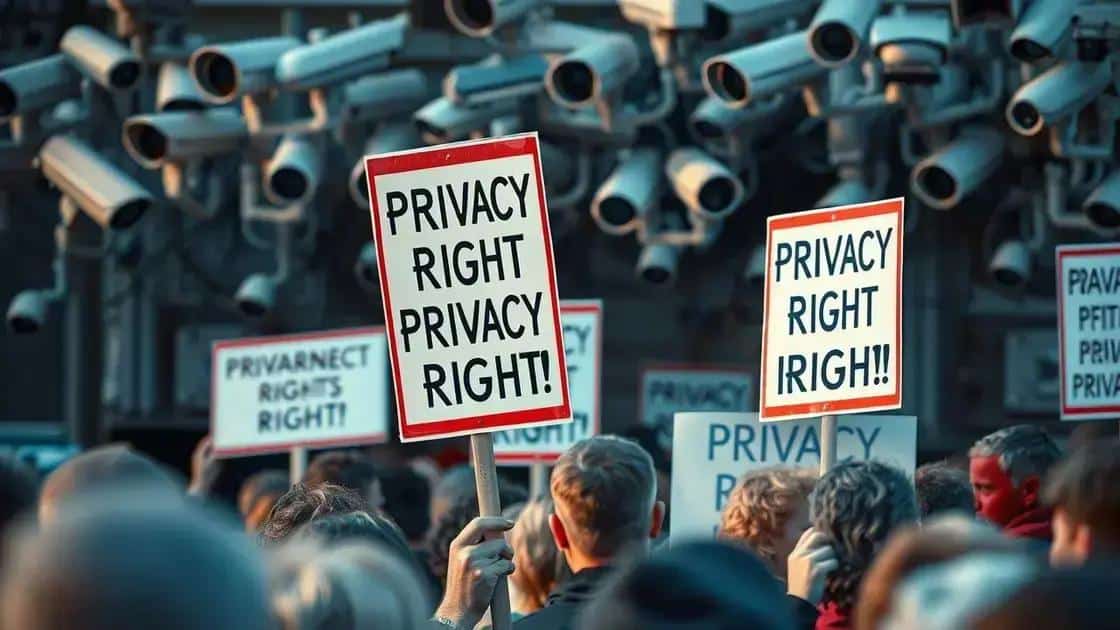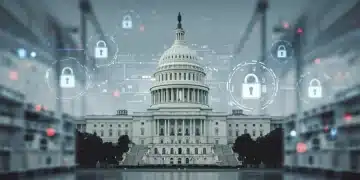Public reaction to surveillance laws expansion: What to expect

The public reaction to surveillance laws expansion encompasses concerns about privacy loss, government overreach, and the balance between security and civil liberties, prompting advocacy for stronger protections and reforms.
Public reaction to surveillance laws expansion is more than just legal jargon; it’s a pivotal topic that touches everyone’s daily lives. Have you ever wondered how these laws affect your privacy? Let’s dive deeper into this critical issue.
Understanding the current surveillance laws
Understanding the current surveillance laws is essential for grasping the impact of government oversight on individual freedoms. These laws dictate how data is collected and used, leading to significant public concern about privacy.
Key Elements of Surveillance Laws
Surveillance laws encompass various regulations designed to monitor activities for security purposes. They often involve high-profile legislation that reflects societal fears and priorities. The balance between public safety and personal privacy is a constant struggle. Key aspects include:
- The extent of government access to personal data
- The legal grounds for electronic surveillance
- The required oversight mechanisms to protect citizens
Notably, updates and changes in these laws can stir public debate. The introduction of new technologies often conflicts with existing regulations, resulting in calls for reform. Furthermore, many individuals are becoming increasingly aware of how these laws affect their daily lives.
Public Awareness and Engagement
While discussions around surveillance laws can feel abstract, they have a direct impact on communities. Increasing public awareness is crucial, leading to a push for transparency and accountability. Many individuals now seek to understand the implications of data collection practices as they grow concerned about their rights under such laws.
As citizens engage more with these topics, they often turn to social media and community forums for discussions. Grassroots movements are emerging, advocating for changes to protect civil liberties. The dialogue fosters a culture of accountability and scrutiny, influencing lawmakers to consider public opinion.
In summary, by understanding current surveillance laws, people can better navigate discussions about their rights and privacy in an increasingly monitored world. Staying informed encourages a more engaged citizenry, which is vital for the protection of freedoms.
Key public concerns about surveillance expansion

Key public concerns about surveillance expansion are at the forefront of today’s discussions. As laws become stricter and monitoring increases, people’s fears regarding privacy and freedom grow significantly.
Primary Concerns
Public sentiment is influenced by various factors, leading to pressing questions about surveillance’s impact on daily life. Some of the main worries include:
- **Loss of privacy**: Many individuals feel that their personal lives are under constant scrutiny.
- **Data security**: There are fears about how data collected may be misused or compromised.
- **Government overreach**: The fear of an overreaching government is a significant concern for citizens.
People are increasingly aware that even innocuous technology can contribute to surveillance. Apps that track locations or Internet behavior can accumulate data without individuals’ knowledge. This situation has led to a heightened demand for transparency in how personal information is handled.
Impact on Civil Liberties
As surveillance expands, many worry about the potential infringement on civil liberties. People often express apprehension that excessive monitoring can lead to a chilling effect on free speech and expression. The fear is that individuals may hesitate to voice their opinions or engage in certain activities if they believe they are being watched.
In addition, discussions around surveillance often miss the importance of community trust. When citizens feel that they are monitored unfairly, their relationship with law enforcement can be severely damaged. This situation prompts calls for balanced approaches, emphasizing that law enforcement must ensure society’s safety while respecting individual rights.
Ultimately, public concerns regarding the expansion of surveillance highlight the necessity for a careful dialogue between legislation, safety, and individual freedoms. By addressing these worries, society can develop frameworks that protect citizens while promoting security.
Recent events influencing public sentiment
Recent events influencing public sentiment have significantly shaped perspectives on surveillance laws. As new technologies emerge, so do concerns about privacy and individual rights. People are more aware than ever about the implications of legislation surrounding surveillance.
High-Profile Cases
In recent years, several high-profile cases have captured public attention. These incidents have sparked debates about the limits of surveillance, highlighting the delicate balance between security and freedom. Examples include:
- **Data breaches** that exposed personal information
- **Government spying scandals** revealing overreach
- **Protests against surveillance practices** in various communities
These events have prompted citizens to rethink their trust in surveillance systems. The overwhelming response often revolves around protecting individual freedoms from excessive government involvement.
Technological Advances and Public Awareness
The rise of new technologies has also played a crucial role. With platforms that can track user behavior and collect data, people have started to express their discomfort with how their information is used. This growing awareness encourages discussions about data privacy, and many advocate for clearer regulations.
Social media campaigns have helped raise awareness of these issues as well. As a result, public pressure often leads to increased scrutiny of surveillance practices. Citizens demand transparency and accountability, which can influence lawmakers to consider the implications of their actions.
In many cases, communities mobilize to voice their concerns against perceived intrusions on privacy rights. The call for reform becomes louder when groups organize and share their experiences regarding surveillance’s impact on their lives.
Future implications of expanded surveillance laws

The future implications of expanded surveillance laws could be vast and transformative. As technology continues to evolve, so too will the ways in which governments monitor citizens. This could lead to a mix of advancements and challenges in civil liberties and privacy rights.
Potential Advancements in Security
One major implication of expanded surveillance is the potential for enhanced security. By using advanced technologies like artificial intelligence, authorities may be able to identify threats more effectively. Some possible advancements include:
- **Predictive analytics** to preemptively identify criminal activities
- **Real-time monitoring** of public spaces for immediate responses
- **Data integration** across various law enforcement agencies
These enhancements might lead to safer communities, but they also raise essential questions about individual freedoms.
Impact on Privacy Rights
As surveillance laws expand, the right to privacy might be significantly challenged. Increased monitoring can lead to fears of a surveillance state, where everyday actions are continuously tracked. This environment could discourage citizens from expressing their thoughts freely. Concerns arise over how much information law enforcement can access without proper oversight.
The public reaction may spur movements advocating for stronger privacy protections. As citizens become aware of the implications of surveillance laws, they may push for reforms to protect their rights. Companies may also face pressure to improve privacy standards, fostering a culture that prioritizes transparency.
In this evolving landscape, the balance between ensuring security and respecting privacy rights will be crucial. Ongoing conversations and legislative efforts will play a vital role in determining how surveillance laws shape society in the future.
FAQ – Frequently Asked Questions about Surveillance Laws and Public Reaction
What are surveillance laws?
Surveillance laws govern how governments can monitor individuals and collect data for security purposes. They aim to balance public safety and personal privacy.
Why are people concerned about expanded surveillance laws?
Many people fear that expanded surveillance could lead to a loss of privacy, increased government control, and potential misuse of personal data.
How can citizens advocate for their privacy rights?
Citizens can advocate for their privacy rights by staying informed, participating in community discussions, and supporting organizations that promote civil liberties.
What are the potential benefits of surveillance technologies?
While there are concerns, surveillance technologies can enhance public safety by helping law enforcement prevent crime and respond to emergencies more effectively.





